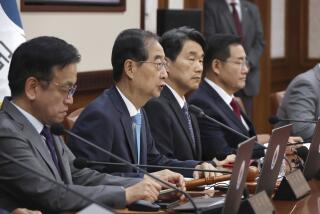U.S., Seoul Delay Military Exercises : Defense: Decision on Team Spirit maneuvers is postponed to give N. Korea time to comply with nuclear inspections.
- Share via
WASHINGTON — The United States and South Korea on Friday postponed any decision on reviving their joint military exercises to give North Korea time to respond to a new U.N. Security Council statement urging it to allow full inspection of its nuclear plants.
The postponement was announced in a news conference by Han Sung Joo, South Korea’s foreign minister, following meetings with Defense Secretary William J. Perry and other top U.S. policy-makers. U.S. officials later confirmed the postponement.
The action is largely symbolic, since the annual exercises are not considered essential to allied military operations. But strategists hope the delay will give North Korea, which has made the exercises a visible bargaining chip in the dispute, a face-saving way to comply.
At the same time, Pentagon officials said they are proceeding with plans to send six batteries of advanced Patriot air-defense missiles to South Korea to help protect U.S. military bases there. Ships carrying the Patriots already have left for South Korea.
The Security Council statement, drafted by China and issued by the 15-member body late Thursday, is non-binding; it urged North Korea to comply with inspections of its nuclear facilities by the International Atomic Energy Agency.
The action, which required no formal vote by the council, fell short of the formal resolution that the United States initially had sought, which would have mandated North Korea’s compliance.
But Han and U.S. officials asserted Friday that the fact that China had been intimately involved in the effort was likely to intensify pressure on North Korea to go along with the U.N. urging. The Chinese have been the North Korean government’s sole ally in the inspections dispute.
Despite Friday’s compromise by Washington and Seoul, the North Koreans reacted negatively.
Pak Gil Yon, North Korea’s U.N. ambassador, told reporters that the Security Council action “will not help the solution” of the problem.
“We have nothing more to show the (international) inspectors at this time,” he said.
*
Even so, Han--in a view that was shared by top U.S. officials--all but predicted that the government in the North Korean capital of Pyongyang eventually will come around and permit the inspections, particularly after prodding from China.
“You don’t expect North Korea to suddenly accept it,” he said.
U.S. officials said Washington decided to go along with the Chinese proposal after it became clear that the United States would not be able to push through a stronger resolution, which would have paved the way for the imposition of sanctions if Pyongyang balked.
However, U.S. strategists argued Friday that, having acceded to the lower-key approach, they will be in a stronger position to win Security Council approval for sanctions if North Korea continues to bar the international weapons inspectors.
Indeed, the statement issued Thursday warns that “further Security Council consideration will take place if necessary in order to achieve full implementation” of the demands for resumption of inspections--a veiled threat of possible sanctions.
*
The dispute stems from North Korea’s abrupt refusal in March to allow monitors from the IAEA to inspect two key nuclear weapons plants to verify whether Pyongyang is building a nuclear weapon, as Western intelligence agencies suspect.
Last month, the IAEA declared that, with North Korea unwilling to permit inspections, it was unable to guarantee that Pyongyang is not manufacturing plutonium, the main ingredient for nuclear weapons. The agency referred the issue to the Security Council.
With North Korea’s rhetoric at a fever pitch, U.S. officials have been trying to walk a diplomatic tightrope, calling for a last-ditch effort at negotiations while at the same time quietly bolstering U.S. military strength should hostilities break out.
Both the military exercises--known as Team Spirit--and the plan to ship Patriot air-defense missile batteries to South Korea have become major bargaining chips in the dispute over the last few months.
U.S. officials said Friday that they hoped Pyongyang will accept the new deferral of a decision on the Team Spirit exercises as a goodwill gesture and not continue to protest the shipment of Patriots, which they said clearly are defensive weapons.
Officials conceded privately that the postponement will force the allies to cut the exercises back sharply, to avoid interfering with the South Korean planting season.
More to Read
Sign up for Essential California
The most important California stories and recommendations in your inbox every morning.
You may occasionally receive promotional content from the Los Angeles Times.













